Dogs are not just our faithful companions; they are cherished members of our families. As pet owners, we want to ensure that our furry friends receive the best care and nutrition to keep them happy and healthy. When it comes to the diet of our canine companions, incorporating fruits and vegetables can provide essential vitamins, minerals, and fiber. In this comprehensive guide, we will explore the best fruit and veg options for dogs, along with tips on how to safely introduce them into their diet.
Key Takeaways
- Certain fruits and vegetables can be safely incorporated into a dog’s diet as part of a balanced and natural eating regimen.
- Apples, bananas, blueberries, cantaloupe, mango, oranges, and pears are among the safe fruits for dogs, offering various nutritional benefits.
- Avoid giving dogs avocados, grapes, cherries, onions, and mushrooms as these can be toxic and harmful to their health.
- Carrots, cucumbers, peas, pumpkin, and sweet potatoes are safe and nutritious vegetables that can be included in a dog’s diet.
- Fruits and vegetables provide essential nutrients, support a strong immune system, promote healthy skin and coat, and aid digestion in dogs.
Always consult with a veterinarian before introducing any new fruits into your dog’s diet, as some fruits may be harmful to dogs.
Safe Fruits for Dogs: Apples, Bananas, Blueberries, Cantaloupe, Mango, Oranges, Pears
When it comes to selecting safe fruits for your furry friend, there are several options that can provide essential nutrients and delicious flavors. Here are some fruits that are not only safe for dogs but also offer a range of health benefits:
Apples
Apples are a popular choice for dog owners due to their high vitamin content and crunchy texture. They are a great source of vitamins A and C, as well as dietary fiber. However, it’s important to remove the seeds and core before feeding apples to your dog, as they can be a choking hazard.
Bananas
Bananas are a nutritious and low-calorie treat for dogs. They are rich in potassium, which is essential for healthy muscle function. In addition, bananas contain vitamins such as vitamin C and vitamin B6. These fruits can be fed to dogs as a natural alternative to processed treats, but it’s important to keep portions moderate due to their sugar content.
Blueberries
Blueberries are packed with antioxidants and offer a wide range of health benefits for dogs. They are low in calories and high in nutrients, including vitamins C and K, fiber, and phytochemicals. These small berries can be served as a tasty snack or added to your dog’s regular meals to boost their nutrition.
Cantaloupe
Cantaloupe is a juicy and refreshing fruit that can be enjoyed by dogs in moderation. It is rich in vitamins A and C, as well as dietary fiber. However, due to its natural sugar content, it’s important to feed cantaloupe to your dog in small quantities to avoid digestive issues.
Mango
Mango is a tropical fruit that is safe for dogs and offers a range of health benefits. It is packed with vitamins A, C, and E, as well as dietary fiber. Mango can be served to dogs as a delicious treat or added to their meals for added flavor and nutrition.
Oranges
Oranges, like other citrus fruits, can be fed to dogs in small quantities. They are a good source of vitamin C and can provide a refreshing burst of flavor. However, it’s important to remove the peel and seeds before offering oranges to your dog, as they can be difficult to digest.
Pears
Pears are a nutritious and high-fiber fruit that can be enjoyed by dogs. They contain vitamins A and C, as well as dietary fiber, which can support digestive health. Pears can be served fresh or cooked, but it’s important to remove the seeds and core before feeding them to your dog.
These safe fruits can be a delicious and healthy addition to your dog’s diet. Always introduce new fruits gradually and monitor your dog for any signs of allergies or digestive issues. Remember to consult with your veterinarian before making any significant changes to your dog’s diet, especially if they have any underlying health conditions.
Fruits to Avoid: Avocado, Grapes, Cherries
Fruits are often seen as a healthy addition to a dog’s diet, providing essential vitamins and minerals. However, it’s crucial to be aware of the fruits that can be toxic to dogs. The following fruits should be avoided when feeding your furry friend:
- Avocado: Avocado contains a substance called persin, which can cause digestive issues in dogs. It’s best to keep avocados away from your pets to ensure their well-being.
- Grapes: Grapes and raisins are highly toxic to dogs and can lead to kidney failure. Even a small amount of grapes can have severe consequences, so it’s important to be vigilant and keep grapes out of your dog’s reach.
- Cherries: While cherries may seem harmless, they can pose a risk to dogs. The fleshy part around the pit contains cyanide, which is toxic to dogs. It’s best to avoid giving cherries to your furry friend.
Keeping these fruits out of your dog’s diet is essential for their health and well-being. If you suspect that your dog has ingested any of these fruits or is showing signs of illness, it’s crucial to consult with a veterinarian immediately.
Table: Fruits to Avoid for Dogs
| Fruit | Toxic Component | Consequences |
|---|---|---|
| Avocado | Persin | Can cause digestive issues |
| Grapes | Unknown | Can lead to kidney failure |
| Cherries | Cyanide in the pit | Can be toxic |
Remember, it’s always better to be safe than sorry when it comes to your dog’s diet. By avoiding these fruits, you can ensure that your furry friend stays healthy and happy.
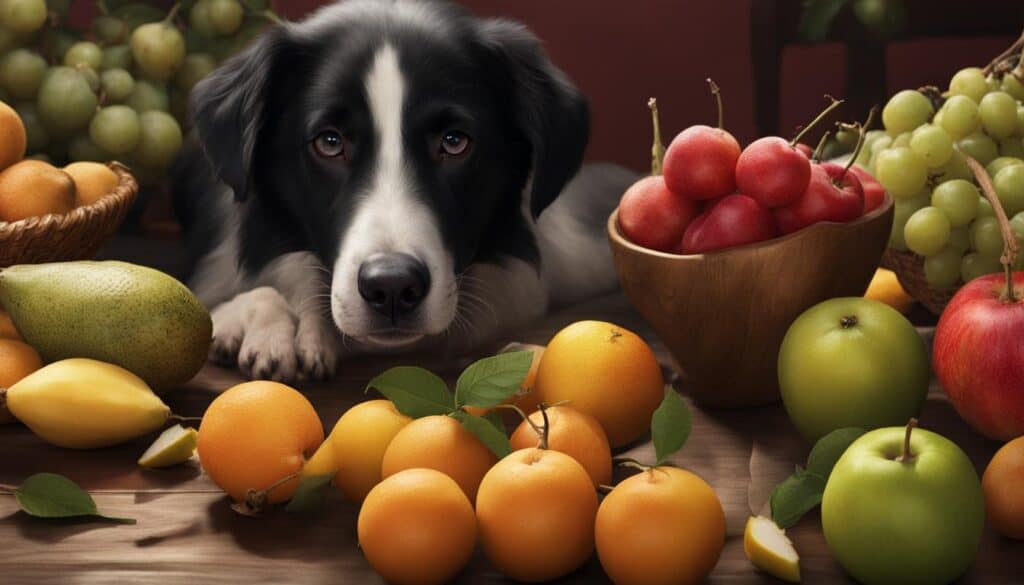
Safe Vegetables for Dogs
Incorporating vegetables into your dog’s diet can provide them with essential nutrients and contribute to their overall health and wellbeing. Here are some safe vegetables that you can feed your furry friend:
- Carrots: Carrots are a crunchy and low-calorie vegetable that dogs love. They are rich in vitamins and minerals, particularly beta-carotene, which is essential for eye health.
- Cucumbers: Cucumbers are a hydrating option for dogs, as they contain a high water content. They are also low in calories and carbohydrates, making them a healthy choice for weight management.
- Peas: Peas are packed with vitamins, including vitamin A, vitamin C, and vitamin K. They are also a good source of fiber and can aid in digestion.
- Pumpkin: Pumpkin is a superfood for dogs, providing numerous health benefits. It is high in fiber, which can promote healthy digestion, and contains antioxidants that support the immune system.
- Sweet Potatoes: Sweet potatoes are rich in vitamins and minerals, such as vitamin A and potassium. They can contribute to a shiny coat and healthy skin in dogs.
You can serve these vegetables to your dog in various ways. Some dogs enjoy crunching on raw carrots and cucumbers as a healthy snack. Peas and pumpkin can be cooked and mixed with your dog’s regular food. Sweet potatoes can be baked or boiled and served as a nutritious side dish. Remember to cut the vegetables into bite-sized pieces to prevent choking hazards.
Introducing vegetables into your dog’s diet should be done gradually. Start by offering small amounts and monitor their reaction. If your dog experiences any digestive issues or allergic reactions, discontinue feeding them the specific vegetable and consult with your veterinarian.
Table: Nutritional Benefits of Safe Vegetables for Dogs
| Vegetable | Nutritional Benefits |
|---|---|
| Carrots | Rich in beta-carotene for eye health |
| Cucumbers | Hydrating and low in calories |
| Peas | Contains vitamins and aids digestion |
| Pumpkin | High in fiber and supports the immune system |
| Sweet Potatoes | Rich in vitamins and contributes to a healthy coat |
Remember that vegetables should not replace a balanced and complete dog food. Consult with your veterinarian to determine the appropriate amount and frequency of feeding vegetables to your dog based on their individual nutritional needs.
Vegetables to Avoid: Onions and Mushrooms
While many vegetables offer numerous health benefits for dogs, there are a few that should be avoided due to potential toxicity. Onions and mushrooms are two vegetables that can be harmful to our furry friends.
Onions: Onions, along with leeks and chives, contain compounds that can cause severe digestive distress and damage to a dog’s red blood cells. Even small amounts of onion can be toxic to dogs, so it’s important to avoid feeding them any dishes or treats that contain onions as an ingredient.
Mushrooms: Most wild mushrooms are not safe for dogs and should be avoided. While some mushroom species are safe for consumption, it can be challenging to differentiate between toxic and non-toxic varieties. To prevent any potential poisoning or digestive issues, it’s best to avoid feeding dogs mushrooms altogether.
Always keep in mind that the safety and well-being of our canine companions should be our top priority. If you suspect that your dog has ingested onions, mushrooms, or any other potentially toxic substances, contact your veterinarian immediately for guidance and assistance.
| Veggie | Toxicity Level |
|---|---|
| Onions | Highly toxic |
| Mushrooms | Varies (most are toxic) |
Benefits of Fruit and Vegetable Treats for Dogs
Adding fruits and vegetables to a dog’s diet can have numerous benefits for their overall health and well-being. These natural treats provide essential nutrients and can support various aspects of canine health.
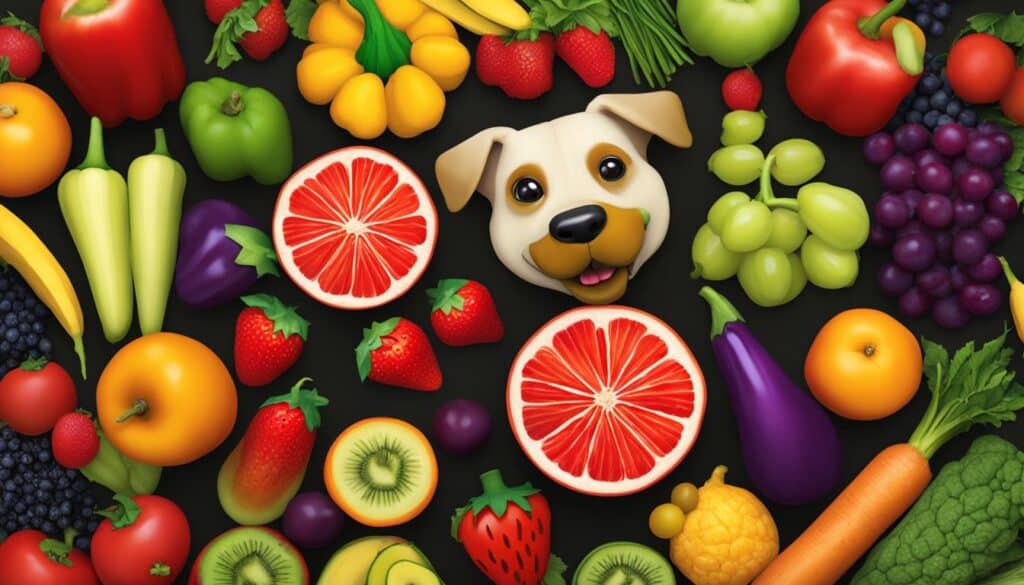
1. Strong Immune System
Fruits and vegetables are rich in vitamins and antioxidants that help boost a dog’s immune system. Vitamin C, found in fruits like oranges and strawberries, can strengthen their natural defenses and protect against illness. Antioxidants, such as those found in blueberries and spinach, help fight off free radicals and reduce the risk of chronic diseases.
2. Healthy Skin and Coat
The vitamins and minerals present in fruits and vegetables contribute to healthy skin and a shiny coat. For example, sweet potatoes and carrots are packed with beta-carotene, which the body converts into vitamin A. This vitamin promotes skin cell regeneration and helps maintain a healthy coat.
3. Digestive Health
Fruits and vegetables are a great source of dietary fiber, which aids in digestion and can prevent constipation. Fiber-rich options like pumpkin and peas can also help regulate a dog’s bowel movements and promote a healthy gut.
Incorporating fruits and vegetables into a dog’s diet can provide them with a wide range of nutrients, while also offering a low-calorie and nutritious alternative to processed dog treats. However, it’s important to consult with a veterinarian before making any significant changes to a dog’s diet to ensure the proper balance of nutrients based on their individual needs.
How to Safely Feed Fruits and Vegetables to Dogs
Feeding fruits and vegetables to your furry friend can be a nutritious and enjoyable addition to their diet. However, it’s important to follow some guidelines to ensure their safety and well-being. Here are some tips on how to safely incorporate fruits and vegetables into your dog’s meals:
Introduce new foods gradually
When introducing fruits and vegetables to your dog’s diet, it’s best to start slowly. Introduce one new food at a time and monitor your dog for any signs of allergies or digestive issues. This will help you identify any specific fruits or vegetables that may not agree with their system.
Remove seeds, pits, and cores
Before feeding fruits and vegetables to your dog, make sure to remove any seeds, pits, and cores. These parts can pose a choking hazard or contain toxins that are harmful to dogs. For example, apple seeds contain small amounts of cyanide, which is toxic to dogs.
Cut them into bite-sized pieces
To make it easier for your dog to eat, always cut fruits and vegetables into bite-sized pieces. This will help prevent choking and ensure that your dog can comfortably chew and digest the food. Remember, dogs have smaller mouths than humans, so adjust the size accordingly.
Know the safe and toxic fruits and vegetables
It’s important to be aware of which fruits and vegetables are safe and which ones are toxic for dogs. As mentioned in previous sections, fruits like apples, bananas, blueberries, cantaloupe, mango, oranges, and pears are safe for dogs in moderation. However, avocados, grapes, and cherries should be strictly avoided. Always do your research or consult with your veterinarian before introducing any new food to your dog’s diet.
| Fruits | Safe for Dogs | Quantity |
|---|---|---|
| Apples | Yes | Remove seeds and core |
| Bananas | Yes | Small amounts |
| Blueberries | Yes | Can be given as treats |
| Cantaloupe | Yes | Feed in moderation due to sugar content |
| Mango | Yes | Remove peel and pit |
| Oranges | Yes | Small amounts, remove peel and seeds |
| Pears | Yes | Remove seeds and core |
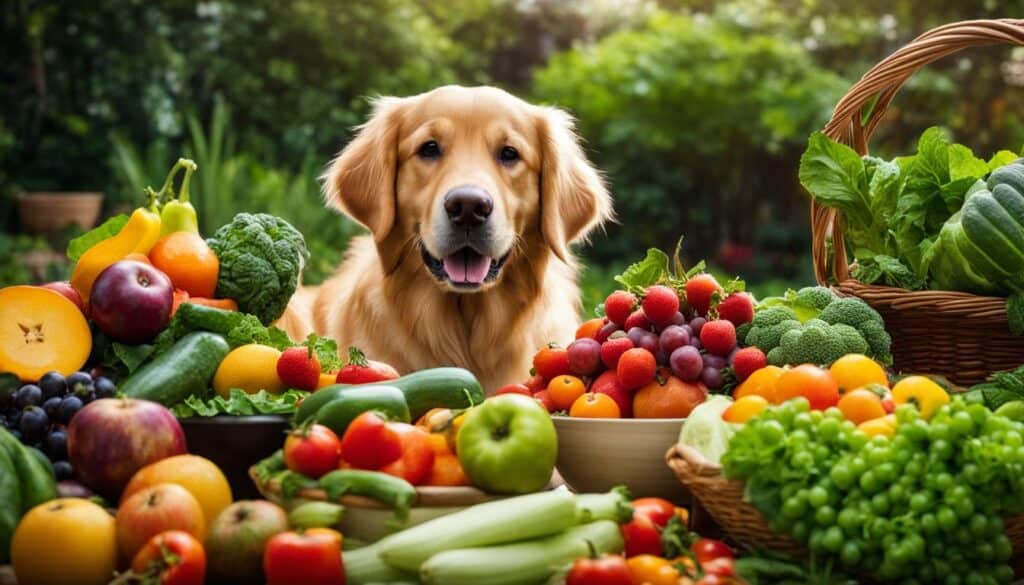
Feeding your dog a variety of safe and nutritious fruits and vegetables can provide them with essential vitamins, minerals, and fiber. Just remember to take necessary precautions, monitor their reactions, and be mindful of portion sizes. With proper introduction and moderation, fruits and vegetables can be a healthy and enjoyable part of your dog’s diet.
Dog-Friendly Fruit and Veg Treats: A Healthy and Tasty Snack Option
When it comes to treating your furry friend, why not consider dog-friendly fruit and vegetable treats? These snacks offer a nutritious and delicious alternative to processed treats, providing your dog with essential vitamins, minerals, and fiber. Plus, they are a great way to add some variety to your dog’s diet.
There are plenty of options available in pet stores that offer a wide range of fruit and veg treats specifically designed for dogs. These treats are often made with natural ingredients, carefully selected to ensure they are safe and beneficial for your dog’s health. Look for treats that are free from added sugars or artificial additives to provide the best quality snack for your four-legged companion.
Whether you choose freeze-dried fruit treats, dehydrated vegetable snacks, or even homemade fruit and veggie biscuits, you can be confident that you are giving your dog a wholesome treat option. These treats can be a great source of vitamins, antioxidants, and dietary fiber, promoting a strong immune system, healthy digestion, and overall well-being for your furry friend.
| Treat Option | Description |
|---|---|
| Freeze-dried Fruit Treats | These treats are made by removing the moisture from fresh fruits while preserving their nutritional content. They are lightweight, easy to store, and offer a concentrated flavor dogs will love. |
| Dehydrated Vegetable Snacks | These snacks are created by removing the water content from vegetables, resulting in a crunchy and tasty treat. They provide essential nutrients and can be a great option for dogs who prefer a savory snack. |
| Homemade Fruit and Veggie Biscuits | If you enjoy baking, you can make your own treats using dog-friendly fruits and vegetables. This allows you to have full control over the ingredients, ensuring your dog receives a wholesome and natural snack. |
Remember, while fruit and vegetable treats can be a healthy addition to your dog’s diet, they should not replace a balanced and complete dog food. Consult with your veterinarian to determine the appropriate amount and frequency of including these treats in your dog’s diet based on their individual nutritional needs. With the right choices and moderation, you can provide your dog with a tasty and nutritious snack they’ll love!
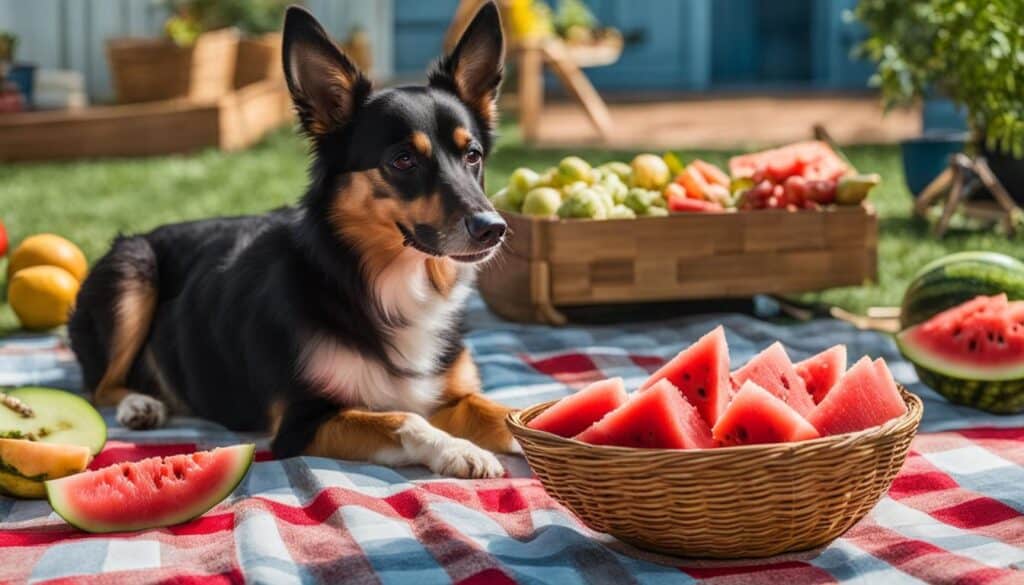
Incorporating Fruits and Vegetables Into Your Dog’s Diet
Feeding your dog a natural diet that includes fruits and vegetables can provide numerous health benefits. However, it’s important to remember that these foods should not replace a balanced and complete dog food. Consult with your veterinarian to determine the appropriate amount and frequency of including fruits and vegetables in your dog’s diet based on their individual nutritional needs.
Incorporating fruits and vegetables into your dog’s meals can offer a variety of nutrients and enhance their overall well-being. When introducing these foods, start with small portions and gradually increase the amount over time. This will allow your dog’s digestive system to adjust and minimize the risk of any adverse reactions. Remember to cut fruits and vegetables into bite-sized pieces and remove any seeds, pits, or cores to ensure they are safe for consumption.
Not all fruits and vegetables are suitable for dogs, so it’s important to be aware of the ones that are safe and those that should be avoided. Some examples of dog-friendly fruits include apples, bananas, blueberries, and pears. These fruits are packed with vitamins, fiber, and antioxidants that can support your dog’s overall health. On the other hand, avocados, grapes, and cherries should be avoided as they can be harmful to dogs.
By incorporating fruits and vegetables into your dog’s diet, you can provide them with a range of essential nutrients while also adding variety to their meals. However, always remember to consult with your veterinarian before making any significant changes to your dog’s diet and ensure that the fruits and vegetables you choose are safe and suitable for your furry friend.
Tips for Introducing Fruits and Vegetables to Picky Eaters
Picky eaters can be a challenge when it comes to introducing new foods, including fruits and vegetables, into their diet. However, with some patience and creativity, you can encourage your furry friend to embrace these nutritious options. Here are some tips to help you navigate the world of picky eating with your dog:
1. Start with Small Pieces
When introducing fruits and vegetables to a picky eater, start by offering small pieces as treats. This allows your dog to get familiar with the new flavors and textures without feeling overwhelmed. Gradually increase the amount over time as your dog becomes more comfortable.
2. Mix with Regular Food
If your dog is hesitant to try fruits and vegetables on their own, try mixing them with their regular food. Chop the fruits and vegetables into small pieces and mix them in with their kibble or wet food. This way, your dog can gradually get used to the taste and texture while still enjoying their familiar meal.
3. Use Them as Toppers
Another way to entice picky eaters is by using fruits and vegetables as delicious toppers for their meals. Simply chop the produce into small pieces and sprinkle them over their food. The added flavors and aromas can make their meal more enticing and encourage them to try new foods.
Remember, every dog is unique, and it may take time for them to warm up to fruits and vegetables. Be patient and persistent, and always monitor your dog’s reaction to ensure they are not experiencing any negative side effects. If you have any concerns, consult with your veterinarian for further guidance.
Conclusion
Adding fruits and vegetables to your dog’s diet can have numerous benefits for their overall health and well-being. These natural and nutritious options can provide essential vitamins, minerals, and fiber that contribute to a balanced diet. However, it’s crucial to be aware of the best fruit and veg for dogs and which ones should be avoided.
By incorporating healthy fruits and vegetables into your dog’s diet, you can support their immune system, promote a shiny coat and healthy skin, aid in digestion, and offer a low-calorie alternative to processed treats. Remember to consult with your veterinarian to determine the right amount and frequency of including fruits and vegetables in your dog’s diet based on their specific nutritional needs.
When introducing fruits and vegetables to your dog, ensure you follow proper guidelines such as removing seeds and pits, cutting them into bite-sized pieces, and introducing new foods gradually. Additionally, consider using dog-friendly fruit and veg treats that are made with natural ingredients and free from added sugars or artificial additives.
In conclusion, a well-balanced diet that includes healthy and nutritious fruits and vegetables can enhance your furry friend’s overall well-being. With moderation and the right selection of fruits and vegetables, you can provide your dog with a variety of tasty and wholesome options that contribute to their optimal health.
FAQ
Are all fruits and vegetables safe for dogs to eat?
No, while many fruits and vegetables are safe for dogs, there are some that should be avoided as they can be toxic to dogs. It’s important to know which ones are safe and which ones should be avoided.
Can dogs eat apples?
Yes, dogs can safely eat apples as long as the seeds and core are removed. Apples are a good source of vitamins A and C for dogs.
Are bananas safe for dogs?
Yes, bananas are safe for dogs and can be a healthy treat. They are low in calories and rich in potassium and vitamins.
Can dogs eat blueberries?
Yes, blueberries are safe for dogs and can provide antioxidants and fiber. They make a nutritious and tasty addition to a dog’s diet.
Is cantaloupe safe for dogs?
Yes, cantaloupe is safe for dogs in moderation. It contains vitamins and fiber but should be given in moderation due to its sugar content.
Can dogs eat oranges?
Yes, dogs can eat oranges in small quantities. However, it’s important to remove the peel and seeds, as they can be difficult to digest.
Are pears safe for dogs?
Yes, pears are safe for dogs and are a high-fiber and nutritious fruit. They can be a healthy addition to a dog’s diet.
Can dogs eat avocado?
No, dogs should avoid avocado as it contains a toxin called persin, which can cause digestive issues.
Are grapes and raisins safe for dogs?
No, grapes and raisins are highly toxic to dogs and can lead to kidney failure. They should never be fed to dogs.
Can dogs eat cherries?
No, cherries should be avoided as the fleshy part around the pit contains cyanide, which can be dangerous to dogs.
Are carrots safe for dogs?
Yes, carrots are safe for dogs and are low in calories. They are also a crunchy vegetable that promotes healthy teeth.
Can dogs eat cucumbers?
Yes, dogs can eat cucumbers and they are a hydrating option that is low in calories and carbohydrates.
Are peas safe for dogs?
Yes, peas are safe for dogs and are packed with vitamins and nutrients. They can be included in a dog’s diet as a healthy addition.
Can dogs eat pumpkin?
Yes, pumpkin is a superfood for dogs and aids in digestive health. It’s also a great source of immune support.
Are sweet potatoes safe for dogs?
Yes, sweet potatoes are safe for dogs and are rich in vitamins and minerals. They contribute to coat and skin health in dogs.
Should dogs avoid onions, leeks, and chives?
Yes, onions, leeks, and chives should be avoided as they contain compounds that can cause severe digestive distress and damage to a dog’s red blood cells.
Are mushrooms safe for dogs?
No, most wild mushrooms are not safe for dogs and should be avoided as they can be poisonous.
Can fruits and vegetables replace a balanced dog food?
No, while fruits and vegetables can be a healthy addition to a dog’s diet, they should not replace a balanced and complete dog food. Consult with your veterinarian for a proper diet plan for your dog.
How can I encourage my dog to eat fruits and vegetables?
To encourage your dog to try new foods, start by offering small pieces as treats and gradually increase the amount. Mixing fruits and vegetables with their regular food or using them as toppers can also make them more appealing to picky eaters.
Where can I find fruit and vegetable treats for dogs?
Many pet stores offer a variety of fruit and vegetable treats specifically designed for dogs. Choose treats made with natural ingredients and avoid those with added sugars or artificial additives.

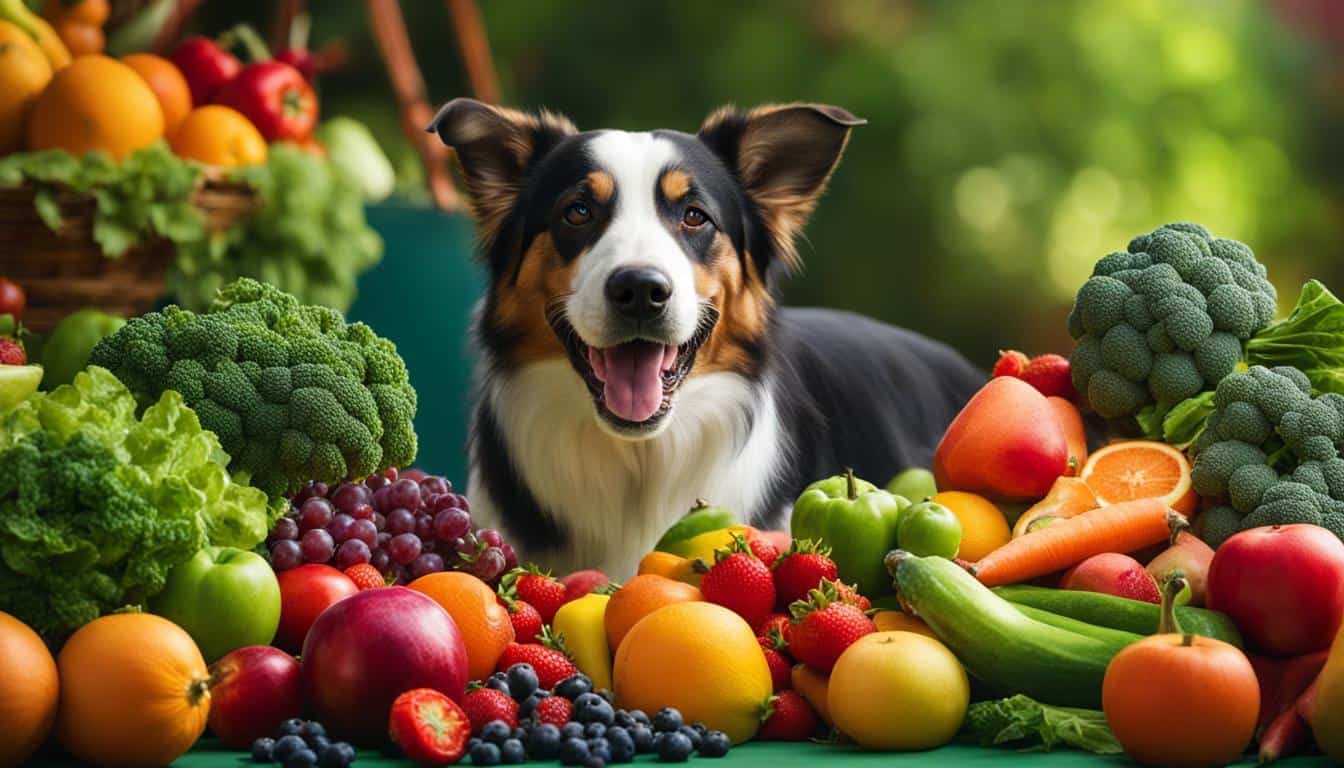



Leave a Reply